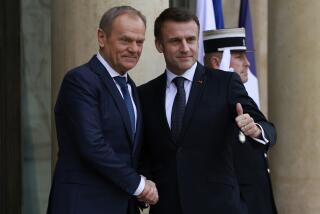West Warned by Gorbachev on East Europe
- Share via
MOSCOW — Soviet President Mikhail S. Gorbachev, welcoming the reforms in Eastern Europe as historic and far-reaching, warned the West on Tuesday not to meddle in the developments there nor to “clamor about victory in the Cold War” because of the changes.
Gorbachev, in his first comments on the dramatic developments in East Germany, told visiting French Foreign Affairs Minister Roland Dumas that Europe’s overall stability must continue to be ensured by East-West understandings if the reforms are to succeed.
His comments and those of Eduard A. Shevardnadze, the Soviet foreign minister, made clear the extreme delicacy for Moscow of the fast-moving changes in Eastern Europe, a region that it still half-regards as within its sphere of influence politically and strategically and as crucial to its security.
Moscow is looking for “the West’s understanding of the situation,” Shevardnadze said, implying that it expects the West not to exploit what it might see as a Soviet vulnerability in Eastern Europe.
Gorbachev plans to discuss the developments in Eastern Europe extensively with President Bush at an informal summit meeting aboard warships in the Mediterranean off Malta on Dec. 2 and 3, according to Soviet sources, and Shevardnadze won French support on Tuesday for a proposed all-European summit to discuss the continent’s future.
The Soviet Union is particularly concerned, Gorbachev and Shevardnadze told Dumas, by calls in West Germany for German reunification and by broader Western attempts to intervene in the reforms to ensure that capitalism triumphs over socialism in Eastern Europe as a whole.
In Washington, a senior Bush Administration official said Gorbachev’s comments echoed several private warnings made by the Soviet government over the weekend. He said the Soviet messages put the West firmly on notice that the Kremlin will oppose any early move to end the division of Germany.
“They emphasized their concerns about (German) reunification and about a dangerous situation getting out of hand, without trying to overturn what had already happened in Berlin,” the official said.
Another source said the U.S. and British ambassadors to Moscow were called to the Soviet Foreign Ministry and given the message.
In Moscow’s view, the Western approach to Eastern Europe in coming months will have a major, probably decisive, impact on the shape and character of future East-West relations.
“We have been at a crossroads quite recently,” Gorbachev said, according to an account from the official Tass news agency of his meeting with Dumas. “What road will the world take--to future confrontation, aggravation of ideological struggle, heightening of the danger of war or the road of cooperation, mutual understanding and the quest for accord?”
What Moscow hopes for, the Soviet president continued, is “progress to a new, peaceful period in a calm and considered way. . . .
“It is not time to destroy the established international political and economic institutions,” Gorbachev said. “Let them transform themselves, taking into account their internal processes. Let them find themselves a niche in the new situation and interact.”
On the other hand, “it will be very dangerous,” he said, if the West tries to go back on the understandings and agreements that have brought peace and stability to Europe.
“The depth and importance of the changes dictate the need to step up the efforts to meet each other halfway from the West and from the East,” Gorbachev told Dumas.
Shevardnadze was, characteristically, much blunter in warning of Soviet sensitivities and the danger that wrong moves now could bring. The West, he said, should support East Germany’s reforms, as the Soviet Union did, but it should not press for German reunification for that would destabilize Europe.
“This question has a bearing on the vital interests of many European countries,” Shevardnadze said, as well as on the continent’s post-war borders and political-military alliances and the future of East Germany, a strategic Soviet ally.
Dumas, speaking with journalists after his day of meetings here, said that the Soviet Union as well as the West accept that Germans yearn for reunification or at least a rapprochement that would bring East and West Germany closer together.
The problem, he said, is whether this is a realistic goal.
“We live amid a balance resulting not only from postwar events but also from signed treaties,” he said. “Calling all this into question would cause such an upheaval that it is worthwhile thinking about it beforehand.”
Dumas said he will present the Soviet leaders’ views on the current developments in Eastern Europe at a special European Community summit in Paris on Saturday that President Francois Mitterrand has called to discuss the situation and its impact on European stability and East-West relations.
A second factor in the Soviet view has been, as one Moscow commentator here put it, “the positive crowing from the West that ‘we won, you lost’ because of what is really the self-transformation of socialism, its self-renewal, its self-renovation.”
Times staff writer Doyle McManus, in Washington, contributed to this story.
COALITION MOVE--East German leaders held talks with non-Communists. A8
More to Read
Sign up for Essential California
The most important California stories and recommendations in your inbox every morning.
You may occasionally receive promotional content from the Los Angeles Times.













